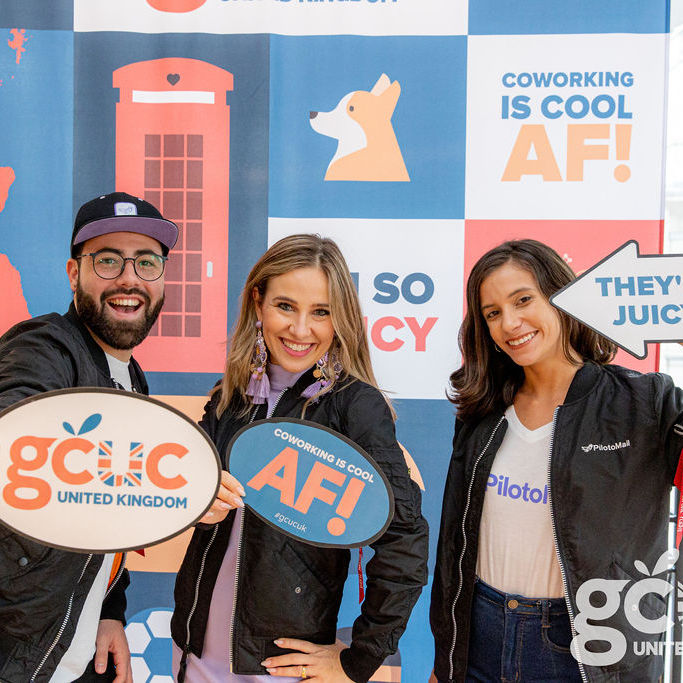
- By Sofia Stolberg
- October 4, 2022
Practically as soon as we landed back in Puerto Rico after the Global Workspace Association conference, we were once again getting on a plane – this time to London for GCUC UK.
Taking place at Convene’s newest location on 22 Bishopsgate, GCUC UK hosted industry leaders from across the UK and neighboring European countries for a content-filled day.
The top 5 things we took away from the 2022 GCUC UK Conference:
1. The base rent per square foot.
GCUC UK kicked off with a data-driven presentation by Instant’s James Rankin and John Williams. After noting the UK’s flex market had bounced back from the pandemic much more strongly than the US one, they wowed the audience with a graph that mapped rent per square foot and return per square foot across prime locations and secondary and tertiary locations in the UK. While prime locations were able to get a 3x return, locations located in more suburban areas could get a return as high as six times the base rent per square foot when delivering a coworking offering.
2. Business models are evolving, but we all need to get used to uncertainty and black swan events.
Moderated by Zoe Ellis-Moore from Spaces to Places, the panel on diverse models with Alexandra Brunner from Clockwise, Ryan Simonnetti from Convene, Sami Fossat from United Franchise Group, and Alex Hill from CBRE touched on the differences in business models across operators. Ryan Simonetti described Convene’s serviced event space model which they have successfully rolled out across 27 locations in the US and Europe noting that when they enter managed agreements with landlords they become a critical amenity for the building and shape the way other tenants design their spaces since they can enjoy the convenience of using their conference and training rooms instead of building out their own. When asked about their approach to the pandemic, Alexandra Brunner stood out by stating they had gone in the opposite direction of most operators by expanding quickly and successfully opening 10 new locations while others scaled back! All panelists agreed that the future of work and flex would require operators to learn how to navigate uncertainty, bring new products or services to market in response, and get used to the idea that black swan events are now more prevalent than ever before.
3. When expanding, cash is king and so is knowing when to leave the negotiation table.
Justin Harly from Yardi moderated a panel with Zach Douglas from Orega, David Kaiser from WeWork, Douglas Green from g8consult, and Gal Leslie from 2-work where participants took turns describing their expansion strategies. WeWork’s David Kaiser spoke about the benefits of scale, the 30,000 square-foot minimum for their spaces, and their ability to shape the amenities and food and beverage options at the buildings they enter to ensure they cater to the surrounding neighborhood’s offerings and needs. Zach Douglas chimed in on striking deals through managed contracts for his now 30-space brand and spoke about the importance of reaching profitability and having enough cash to fuel expansion efforts. Gal Leslie emphasized the importance of understanding market dynamics and the gaps at your location to fill demand voids. All participants agreed that there is no right or wrong way to go about expansion, but the key lies in sticking to what has worked for you and knowing how and when to walk out of a room if the deal doesn’t make sense for your bottom line.
4. We need more and better data to get the financial sector onboard.
On more than one occasion panelists and audience members agreed that the flex office industry needed open data that could tell our collective story and eventually get the financial sector working with landlords in a way that could unlock the true potential of the sector in much the same way as it did with the hotel industry. In short, there was a lot of talk about a third-party player that could aggregate data on our sector and help us move forward.
5. Virtual Offices can help you free yourself from the square footage cap on your revenue.
Our very own Sofia Stolberg closed the day by praising the virtues of Virtual Office memberships and their ability to help operators escape the square footage cap on their revenue and enter the most scalable and profitable product offering in coworking. She certainly gave audience members a lot to think about when she touted that 40% of the revenue stack at her sister company Piloto 151 coworking spaces came from Virtual Offices. The talk sparked a lively Q&A session that ended with her vowing to automate the UK compliance process for Virtual Offices, in much the same way that PilotoMail automates the US one.
About PilotoMail
PilotoMail is a mail management platform powering mailroom automation and virtual mailboxes for the remote workforce. By giving mailrooms a digital-first makeover, mail operators can deliver outstanding services all while managing large volumes of mail efficiently, complying with all postal regulations easily, and increasing revenue effortlessly.





